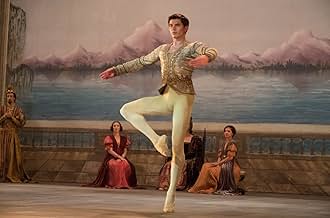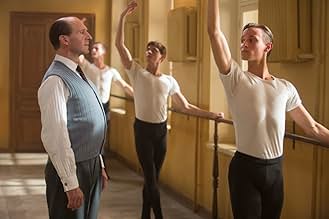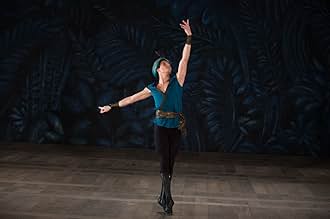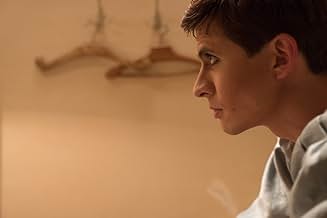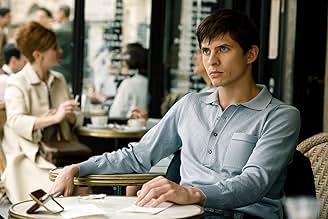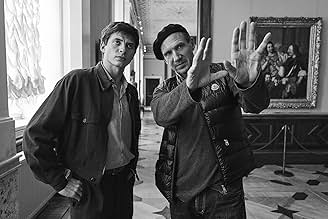CALIFICACIÓN DE IMDb
6.6/10
7.3 k
TU CALIFICACIÓN
La historia de cómo el bailarín Rudolf Nureyev desertó de la Unión Soviética por Occidente.La historia de cómo el bailarín Rudolf Nureyev desertó de la Unión Soviética por Occidente.La historia de cómo el bailarín Rudolf Nureyev desertó de la Unión Soviética por Occidente.
- Premios
- 1 premio ganado y 4 nominaciones en total
- Dirección
- Guionistas
- Todo el elenco y el equipo
- Producción, taquilla y más en IMDbPro
Opiniones destacadas
A beautiful film. But not so convincing. Correct but easy to reduce it to the last part tension. Interesting portrait of the period, expression of admiration for Nureev art, seductive ballet scenes and the hard try to convince. But, in too many parts, the film remains only a sketch. The good points - hard effort of Oleg Ivanko to create his role and to convince the viewer, the passion of Ralph Fiennes to the project, the presence of Sergei Polunin and the performance of Adele Exarchopoulos. The result is, obvious, a beautiful one . But convince it ? In few points, with indulgence in other.
First-time actor Oleg Ivenko gives a strong performance here in the lead role of renowned ballet dancer Rudolf Nureyev. The biopic also has a most solid supporting cast and is directed by the fine actor Ralph Fiennes (who also has a supporting role in the film), and is written by the most talented David Hare, based on the book by Julie Kavanagh.
The biopic covers the early years of Nureyev from his most difficult early life in the Soviet Union, his incredible innate talent for ballet dancing, his complicated and flamboyant personality, love of the arts, and a most fervent desire for freedom.
I felt the heart of the movie was the tension filled final 20 minutes or so of Nureyev's defection to the West at a Paris airport, in 1961.He would be the first Soviet notable to do so during the Cold War.
All in all, although this biopic is deliberately paced and a little too long at over 2 hours in length I felt it was a solid effort all around. To note, Rudolph Nureyev would pass away in 1993 from AIDS, at the age of 54.
The biopic covers the early years of Nureyev from his most difficult early life in the Soviet Union, his incredible innate talent for ballet dancing, his complicated and flamboyant personality, love of the arts, and a most fervent desire for freedom.
I felt the heart of the movie was the tension filled final 20 minutes or so of Nureyev's defection to the West at a Paris airport, in 1961.He would be the first Soviet notable to do so during the Cold War.
All in all, although this biopic is deliberately paced and a little too long at over 2 hours in length I felt it was a solid effort all around. To note, Rudolph Nureyev would pass away in 1993 from AIDS, at the age of 54.
Based on the life of Rudolf Nureyev (portrayed by Oleg Ivenko): in different time segments, the life of the ballet great is depicted during his childhood in rural Eastern Russia; his late teen years training in Leningrad (now St. Petersburg); and the Kirov Ballet tour in Paris of 1961 during which Nureyev made a decision that changed his life significantly. The film is based on the novel "Rudolf Nureyev: A Life" by Julie Kavanaugh and is a British/French/Serbian co-production spoken in Russian, French, and English.
One of the enjoyable aspects of the film is following the young man's transition from a rural area into cities as grand as Leningrad and Paris and his awestruck fascination with the visual arts at his disposal. This can easily remind many viewers of their first travel experiences and having felt the same elation.
The three different time sequences are done concurrently which is sometimes jarring and unnecessary. The film would probably have been better if done chronologically with only occasional flashbacks.
Around the halfway mark of the film, Nureyev is showing a lot of irritability in a restaurant scene. It is at this mark that the viewer could feel equally irritated after having had enough of the frequent timeline changes and the film's reduced energy by that point. Also in that scene, while Nureyev is showing a strong reaction to class prejudice from other Russians, there was little to indicate this problem in earlier scenes. His rudeness seems to come out of nowhere.
Despite these criticisms, it is all worth it for the extended climactic scene at Paris' Le Bourget Airport (very well re-constructed to resemble its appearance in the early 1960s). Much like the final airport scene in "Argo", the one here has suspense, tension, and mystery even if the outcome is already well known.
"The White Crow" is a fine tribute to an artistic icon and a good depiction of the life of a genius in a restrictive, Communist country although it would have benefited to explore more on another restriction in Rudolf's life under Communisim - his homosexuality. Considering the film concluded when its subject was still very young, it is tempting to encourage a sequel for the remainder of such a very unique life of an extremely rare individual who radically changed fate for his own life and that of the ballet world. - dbamateurcritic
One of the enjoyable aspects of the film is following the young man's transition from a rural area into cities as grand as Leningrad and Paris and his awestruck fascination with the visual arts at his disposal. This can easily remind many viewers of their first travel experiences and having felt the same elation.
The three different time sequences are done concurrently which is sometimes jarring and unnecessary. The film would probably have been better if done chronologically with only occasional flashbacks.
Around the halfway mark of the film, Nureyev is showing a lot of irritability in a restaurant scene. It is at this mark that the viewer could feel equally irritated after having had enough of the frequent timeline changes and the film's reduced energy by that point. Also in that scene, while Nureyev is showing a strong reaction to class prejudice from other Russians, there was little to indicate this problem in earlier scenes. His rudeness seems to come out of nowhere.
Despite these criticisms, it is all worth it for the extended climactic scene at Paris' Le Bourget Airport (very well re-constructed to resemble its appearance in the early 1960s). Much like the final airport scene in "Argo", the one here has suspense, tension, and mystery even if the outcome is already well known.
"The White Crow" is a fine tribute to an artistic icon and a good depiction of the life of a genius in a restrictive, Communist country although it would have benefited to explore more on another restriction in Rudolf's life under Communisim - his homosexuality. Considering the film concluded when its subject was still very young, it is tempting to encourage a sequel for the remainder of such a very unique life of an extremely rare individual who radically changed fate for his own life and that of the ballet world. - dbamateurcritic
This film tells the story of a Russian ballet dancer who defected in France during the cold war.
I can't quite believe how good this film is. The story is intense and captivating, even if you don't know about Rudi or about ballet. The dances portrayed are beautiful, the leading actors are great to look at too. The airport scene is so intense that I watched it several times. I also particularly like the fact that Clara Sant helped Rudi so much, without expecting anything in return. I enjoyed every bit of this film, and I strongly recommend it.
I can't quite believe how good this film is. The story is intense and captivating, even if you don't know about Rudi or about ballet. The dances portrayed are beautiful, the leading actors are great to look at too. The airport scene is so intense that I watched it several times. I also particularly like the fact that Clara Sant helped Rudi so much, without expecting anything in return. I enjoyed every bit of this film, and I strongly recommend it.
'The White Crow' tells of Soviet ballet star Rudolf Nureyev's defection to the West in Paris, 1961. And of his years training in Leningrad. And of his poverty-stricken childhood. Three strands running concurrently through the film make for a busy production. The childhood scenes do little more than establish that Nureyev grew up surrounded by poverty and lots of snow. The Leningrad scenes show him as willing to work for his craft, but intense, self-centred and very arrogant - a proper little diva, in fact. Six years later, in Paris, he is still arrogant - demanding, for example, that a French female companion talk to a Russian waiter on his behalf because he suspects the man of looking down on him. But the intensity has weakened, replaced by an interest in what is around him and a happy curiosity in new things. This, however, does not please his KGB minders.
The film is the third from Ralph Fiennes wearing his director's hat. He does a pretty good job: the childhood scenes are shot in bleak, washed-out colours - almost black-and-white - a clever decision which creates atmosphere; and the climactic defection scene in Le Bourget Airport is heavy with tension. There *are* directoral flaws - something as simple as, for example, giving leading man Oleg Ivenko a different haircut for each era would have prevented this viewer's occasional confusion as to whether I was watching 1960s' Paris Nureyev or the 1950s' Leningrad version! And did we need quite so many extreme close-ups of Ivenko's face? But overall, director Fiennes does a good job...
... which makes it a shame that actor Fiennes turns in one of the weakest performances of the film. His portrayal of Nureyev's teacher Pushkin may, for all I know, be true to the real man, but I found it dreadfully studied and mannered, producing a caricature rather than a character (I will, however, give Fiennes full marks for delivering most of his lines in Russian!) Ukrainian dancer Ivenko, in what according to IMDb is his first acting role, turns in a more naturalistic performance, albeit within the confines of the generously-proportioned ego he is portraying. My personal favourite, however, was Chulpan Khamatova in a nicely-judged portrayal of Pushkin's wife Xenia, whose initial motherly interest in Nureyev (prompted by her husband's concern the stroppy teenager is not eating enough) develops over the course of the film.
Seen in preview at the British Film Institute, and - containing good pacing, an interesting story and nicely-rendered period detail - well worth it.
The film is the third from Ralph Fiennes wearing his director's hat. He does a pretty good job: the childhood scenes are shot in bleak, washed-out colours - almost black-and-white - a clever decision which creates atmosphere; and the climactic defection scene in Le Bourget Airport is heavy with tension. There *are* directoral flaws - something as simple as, for example, giving leading man Oleg Ivenko a different haircut for each era would have prevented this viewer's occasional confusion as to whether I was watching 1960s' Paris Nureyev or the 1950s' Leningrad version! And did we need quite so many extreme close-ups of Ivenko's face? But overall, director Fiennes does a good job...
... which makes it a shame that actor Fiennes turns in one of the weakest performances of the film. His portrayal of Nureyev's teacher Pushkin may, for all I know, be true to the real man, but I found it dreadfully studied and mannered, producing a caricature rather than a character (I will, however, give Fiennes full marks for delivering most of his lines in Russian!) Ukrainian dancer Ivenko, in what according to IMDb is his first acting role, turns in a more naturalistic performance, albeit within the confines of the generously-proportioned ego he is portraying. My personal favourite, however, was Chulpan Khamatova in a nicely-judged portrayal of Pushkin's wife Xenia, whose initial motherly interest in Nureyev (prompted by her husband's concern the stroppy teenager is not eating enough) develops over the course of the film.
Seen in preview at the British Film Institute, and - containing good pacing, an interesting story and nicely-rendered period detail - well worth it.
¿Sabías que…?
- TriviaHayden Christensen, who trained extensively in ballet as a child, was first choice to star; however a persistent ankle injury prevented him from being able to perform to the standards demanded by Ralph Fiennes.
- ErroresIn a scene showing a close up of Nureyev's foot performing a tendu, the shoe he is wearing is a white split sole ballet slipper, a shoe that did not exist in the 1960s. Split sole ballet technique shoes have only been on the dance scene since the mid 1990s.
- Citas
Claire Motte: You are with the company? Did you dance tonight?
Rudolf Nureyev: If I had danced, you would remember.
- ConexionesFeatured in Ralph Fiennes & Oleg Ivenko in Conversation (2019)
- Bandas sonorasLa Bayadère 3rd Shade Variation
Composed by Ludwig Minkus
Arranged by Matthias Gohl
Performed by Ilan Eshkeri and The London Metropolitan Orchestra
Selecciones populares
Inicia sesión para calificar y agrega a la lista de videos para obtener recomendaciones personalizadas
- How long is The White Crow?Con tecnología de Alexa
- How good is Ralph Fiennes's Russian pronunciation?
Detalles
- Fecha de lanzamiento
- Países de origen
- Sitios oficiales
- Idiomas
- También se conoce como
- Beyaz Karga
- Locaciones de filmación
- Productoras
- Ver más créditos de la compañía en IMDbPro
Taquilla
- Total en EE. UU. y Canadá
- USD 1,828,784
- Fin de semana de estreno en EE. UU. y Canadá
- USD 78,782
- 28 abr 2019
- Total a nivel mundial
- USD 7,622,595
- Tiempo de ejecución2 horas 7 minutos
- Color
- Relación de aspecto
- 1.85 : 1
Contribuir a esta página
Sugiere una edición o agrega el contenido que falta

Principales brechas de datos
By what name was The White Crow (2018) officially released in India in English?
Responda





